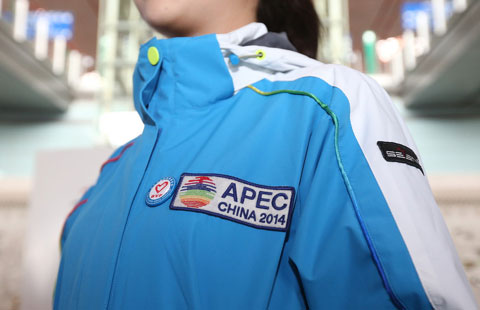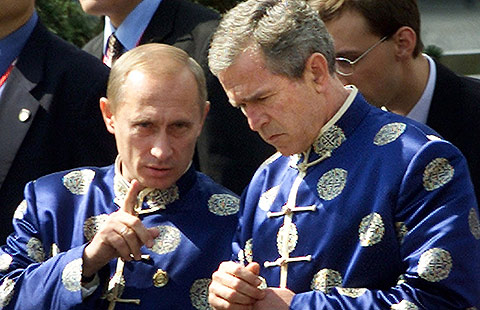Shaping Asia-Pacific's future
Updated: 2014-11-03 07:39
By Wang Yi(China Daily USA)
|
||||||||
APEC Beijing will focus on promoting interconnected development and draw up a new blueprint for comprehensive connectivity
The Asia-Pacific Economic Cooperation will officially open the 22nd APEC Economic Leaders' Meeting in Beijing on Nov 10. Chinese President Xi Jinping and leaders and representatives of the other APEC members will meet in Beijing to discuss the future of APEC and the overall development of the Asia-Pacific region.
This year marks the 25th anniversary of APEC. Twenty-five years ago, 12 economies in the Asia-Pacific jointly announced the inception of APEC. The birth of this new body generated relatively little attention compared with the defining events of the year: the collapse of the Berlin Wall or the end of the Cold War. Yet in the years that have followed, APEC has grown from strength to strength and taken on increasing influence. Today, APEC has evolved into one of the world's premium regional dialogue and cooperation mechanisms, and has a significant and far-reaching relevance to the economic landscape of the Asia-Pacific and beyond.
The world is undergoing a new round of turmoil and instability. Hotspot issues keep emerging and a global economic recovery remains a daunting task. The Asia-Pacific, compared with other regions, has enjoyed overall stability and robust economic growth, serving as an anchor of world stability and a foundation of global prosperity, China has played its due important role in this process. It is fair to say that the world has great expectations for the Asia-Pacific, and China in particular.
As an important member of the Asia-Pacific family, China has always taken the responsibility to promote Asia-Pacific prosperity and stability and has played a constructive role in regional affairs. The Communist Party of China leadership, with Xi Jinping as general secretary, is building on the fine traditions and the diplomatic guidelines and policies of New China, and making even greater initiatives in creating a favorable external environment for realizing the Chinese Dream of the great renewal of the Chinese nation. Greater efforts have been made to ensure that China's development and the development of the world are mutually reinforcing, and that China continues to play an even greater role in regional and international affairs as a major responsible country. That is a main feature of China's diplomacy in the new era and a fundamental direction of its policy toward the Asia-Pacific.
China hosted the ninth APEC Economic Leaders' Meeting in 2001. Now, 13 years later, APEC has come to China once again. This is a mission entrusted by the economies and regions in the Asia-Pacific, and it shows their trust in China. All APEC members look to this year's event for consensus and real breakthroughs in regional integration. They look to the Asia-Pacific region for maintaining prosperity and development and driving global economic recovery and growth. And they look to China, the second-largest economy in the world, to leverage its role as host to make fresh contributions to APEC's development and the Asia-Pacific's revitalization.
With expectations comes pressure, and more importantly, impetus. Over the past year, in close communication with other APEC members, China has made meticulous plans for the theme, topics and outcomes of the meetings. "Shaping the Future Through Asia-Pacific Partnership" is the theme and "Advancing Regional Economic Integration", "Promoting Innovative Development, Economic Reform and Growth" and "Strengthening Comprehensive Development in Infrastructure and Connectivity" are the three major topics. Such designs are in line with the trend of economic development in the Asia-Pacific and the wider world.
President Xi and the Chinese government attach great importance to the APEC meeting in Beijing. We look forward to having in-depth exchanges and positive interactions with other APEC members during the meeting, thus adding new impetus to the APEC process. With the concerted efforts of all parties, the APEC meeting in Beijing is expected to produce a long list of outcomes and make new breakthroughs in the following three priority areas:
First, APEC members will launch the process for the Free Trade Area of the Asia-Pacific and take a new step forward in achieving regional economic integration. The realization of the FTAAP is a long-standing consensus and vision of APEC economic leaders. It will help consolidate the various bilateral and multilateral cooperation mechanisms in the region, and minimize the risks caused by overlapping and fragmented free trade arrangements. Through coordination and cooperation with APEC members, an important consensus will be reached on the launch of the FTAAP process during the meeting in Beijing, sending a clear signal of enhanced regional integration and turning this long-standing vision into concrete actions.
Second, APEC members will identify five pillar areas of cooperation and unleash new impetus for Asia-Pacific economic development: transforming growth models, restructuring economies, fostering steady growth and promoting reform are the common tasks of APEC members. The APEC meeting in Beijing will feature in-depth discussions on economic reform, the new economy, innovative growth, urbanization and inclusive support in order to deepen cooperation in such frontier areas as the Internet economy, urbanization and blue economy. The "APEC Accord on Promoting Innovative Development, Economic Reform and Growth", which is expected to be formulated and adopted at the meeting, will have a far-reaching impact on the future of the Asia-Pacific.
Third, APEC members will focus their efforts on promoting interconnected development and draw up a new blueprint for establishing comprehensive connectivity in the Asia-Pacific region. With a view to benefiting members across the Pacific, we will work for the formulation of the APEC Blueprint on Connectivity, which involves hardware, software and people-to-people exchanges, in order to provide strong support for the long-term development of the Asia-Pacific.
Today, 25 years after its founding, APEC is at a new historic starting point where it can build on past achievements and make new progress for the future. At this year's APEC meeting, we hope three goals will be achieved. First, shaping the future through Asia-Pacific partnership. Second, building an open Asia-Pacific economy. And third, charting the course for APEC development.
The author is the Chinese foreign minister. The article is an excerpt from his speech at the Lanting Forum in Beijing on Oct 29, 2014.
(China Daily USA 11/03/2014 page12)

 NYC marathon held in chilly, windy weather
NYC marathon held in chilly, windy weather
 Volunteers aim high for APEC
Volunteers aim high for APEC
 Sports moments of the week (Oct 27 - Nov 2)
Sports moments of the week (Oct 27 - Nov 2)
 Zhuangyuan museum in Suzhou to open
Zhuangyuan museum in Suzhou to open
 Top 10 most visited video streaming sites in China
Top 10 most visited video streaming sites in China
 Traditional dresses add color to APEC
Traditional dresses add color to APEC
 A brief look at prison breaks in China
A brief look at prison breaks in China
 Chinese airline opens 1st Shanghai-Kathmandu route
Chinese airline opens 1st Shanghai-Kathmandu route
Most Viewed
Editor's Picks

|

|

|

|

|

|
Today's Top News
Wanted: 500,000 pilots for China aviation
Shaping Asia-Pacific's future
Xi stresses CPC's absolute leadership over army
Foreign TV shows online will need permission
Mass Ebola outbreak 'is unlikely'
S. Korea's plastic surgery paradise lost
China, US to meet on WMD nonproliferation
Danone bolsters China presence with $550m deal
US Weekly

|

|







